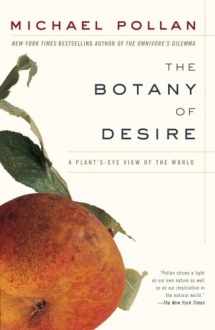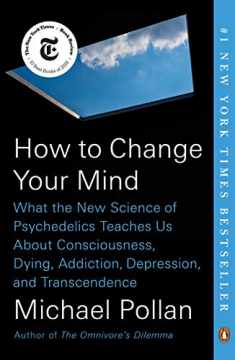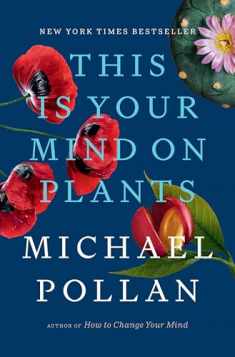
The Botany of Desire: A Plant's-Eye View of the World
ISBN-13:
9780375760396
ISBN-10:
0375760393
Author:
Michael Pollan
Publication date:
2002
Publisher:
Random House Trade Paperbacks
Format:
Paperback
271 pages
Category:
Horticulture
,
Agricultural Sciences
,
Botany
,
Biological Sciences
,
Plants
,
Nature & Ecology
FREE US shipping
on ALL non-marketplace orders
Marketplace
from $4.99
USD
Marketplace offers
Seller
Condition
Note
Seller
Condition
Used - Acceptable
Used books may not include access codes or one time use codes. Proven Seller with Excellent Customer Service. Choose expedited shipping and get it FAST.
Seller
Condition
Used - Good
Paperback book in good condition.
Seller
Condition
New
Brand New! Not overstocks! Brand New direct from the publisher! Ships in sturdy cardboard packaging.
Book details
ISBN-13:
9780375760396
ISBN-10:
0375760393
Author:
Michael Pollan
Publication date:
2002
Publisher:
Random House Trade Paperbacks
Format:
Paperback
271 pages
Category:
Horticulture
,
Agricultural Sciences
,
Botany
,
Biological Sciences
,
Plants
,
Nature & Ecology
Summary
The Botany of Desire: A Plant's-Eye View of the World (ISBN-13: 9780375760396 and ISBN-10: 0375760393), written by authors
Michael Pollan, was published by Random House Trade Paperbacks in 2002.
With an overall rating of 3.7 stars, it's a notable title among other
Horticulture
(Agricultural Sciences, Botany, Biological Sciences, Plants, Nature & Ecology) books. You can easily purchase or rent The Botany of Desire: A Plant's-Eye View of the World (Paperback, Used) from BooksRun,
along with many other new and used
Horticulture
books
and textbooks.
And, if you're looking to sell your copy, our current buyback offer is $0.41.
Description
The book that helped make Michael Pollan, the New York Times bestselling author of How to Change Your Mind, Cooked and The Omnivore’s Dilemma, one of the most trusted food experts in America
Every schoolchild learns about the mutually beneficial dance of honeybees and flowers: The bee collects nectar and pollen to make honey and, in the process, spreads the flowers’ genes far and wide. InThe Botany of Desire, Michael Pollan ingeniously demonstrates how people and domesticated plants have formed a similarly reciprocal relationship. He masterfully links four fundamental human desires—sweetness, beauty, intoxication, and control—with the plants that satisfy them: the apple, the tulip, marijuana, and the potato. In telling the stories of four familiar species, Pollan illustrates how the plants have evolved to satisfy humankind’s most basic yearnings. And just as we’ve benefited from these plants, we have also done well by them. So who is really domesticating whom?
Every schoolchild learns about the mutually beneficial dance of honeybees and flowers: The bee collects nectar and pollen to make honey and, in the process, spreads the flowers’ genes far and wide. InThe Botany of Desire, Michael Pollan ingeniously demonstrates how people and domesticated plants have formed a similarly reciprocal relationship. He masterfully links four fundamental human desires—sweetness, beauty, intoxication, and control—with the plants that satisfy them: the apple, the tulip, marijuana, and the potato. In telling the stories of four familiar species, Pollan illustrates how the plants have evolved to satisfy humankind’s most basic yearnings. And just as we’ve benefited from these plants, we have also done well by them. So who is really domesticating whom?


We would LOVE it if you could help us and other readers by reviewing the book
Book review

Congratulations! We have received your book review.
{user}
{createdAt}
by {truncated_author}




